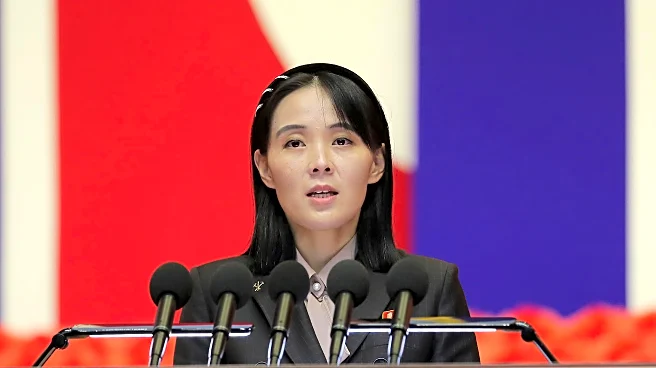What is the story about?
What's Happening?
The Trump administration has unveiled a peace plan for Gaza, which has sparked varied responses from international stakeholders. The plan, which aims to transform Gaza into a demilitarized zone free of terrorism, includes provisions for international aid and reconstruction efforts. A technocratic Palestinian committee, under international supervision, is proposed to manage daily services until the Palestinian Authority completes necessary reforms. The plan, however, does not endorse a two-state solution, instead referring to the Palestinian aspiration for self-determination. This omission has raised concerns among Arab states, particularly Saudi Arabia, about financing the deal. The plan also calls for an international stabilization force to enter Gaza, tasked with training Palestinian police and securing borders. Despite the plan's comprehensive outline, Hamas has expressed reservations, particularly regarding the immediate release of hostages and the phased withdrawal of Israeli forces.
Why It's Important?
The significance of the Trump administration's Gaza peace plan lies in its potential to reshape the geopolitical landscape of the Middle East. By not explicitly supporting a two-state solution, the plan could alter the dynamics of Israeli-Palestinian relations and impact U.S. relations with Arab states. The plan's success hinges on the cooperation of regional partners and the willingness of Hamas to engage constructively. If successful, the plan could lead to a reduction in hostilities and pave the way for economic development in Gaza. However, the lack of a clear path to Palestinian statehood may hinder broader acceptance and support from key stakeholders, potentially affecting the plan's implementation and long-term viability.
What's Next?
The next steps involve diplomatic negotiations and potential adjustments to the plan. Hamas is expected to respond with conditions, particularly concerning the release of hostages and the phased withdrawal of Israeli forces. The international community, including countries like Qatar, Egypt, and Turkey, is likely to play a mediating role to ensure the plan's acceptance. The Trump administration, alongside Israel, will need to address the concerns of Arab states regarding the absence of a statehood pathway. The plan's implementation will require contributions from international forces, with countries like the UAE, Saudi Arabia, and Azerbaijan being potential contributors. The outcome of these negotiations will determine the plan's feasibility and its impact on regional stability.
Beyond the Headlines
The ethical and political implications of the Gaza peace plan are profound. The plan's approach to Palestinian self-determination without immediate statehood raises questions about the future of Palestinian governance and autonomy. The involvement of an international stabilization force introduces new dynamics in regional security and sovereignty. Additionally, the plan's reliance on international aid and reconstruction efforts highlights the ongoing humanitarian challenges in Gaza. The plan's success or failure could influence future U.S. foreign policy in the Middle East and set a precedent for conflict resolution in other regions.


















